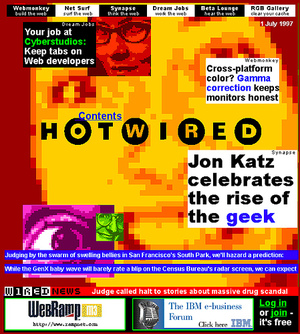tecznotes
Michal Migurski's notebook, listening post, and soapbox. Subscribe to ![]() this blog.
Check out the rest of my site as well.
this blog.
Check out the rest of my site as well.
Jun 29, 2009 5:56am
we are all screen readers now
In 1998, the Web Standards Project (WaSP) opened its doors with the rallying cry "to hell with bad browsers". Their goal was support for W3C web standards with the aim of preventing development costs from skyrocketing as the major browser makers of the time (Netscape and Microsoft) split the public with two diverging products.
One of the core arguments made by standards advocates focused on accessibility requirements, in particular the design of web pages that were available to blind users with screen reader software. Use semantic markup in place of layout tables, single-pixel image shims and GIF text, and what you write will be readable by everyone. I remember making this argument at the web design company I worked out fresh out of college, and it was always a bit of a hard sell even to myself. I didn't quite believe in the legions of blind users out in the world struggling to access my rave flyer portfolio through Jaws, and after a while it all took on a sense of righteousness-for-its-own sake, purity in the face of ugly real-world commercial requirements.

Fast-forward ten years, and I'm now using all those accessibility features on a daily basis. At some point during the dot-com bust it turned out that the written word was the payload, and regular people started using alternative browsing devices to access text from the web. Arguments about device-independent, semantic markup and graceful degradation suddenly have an additional halo of legitimacy because they affect everyone.
I recently bought a Kindle, and I'm again thankful for the past decade's vogue for separation of style and content. I'm pleasantly surprised by the dissolution of technology into behavior, with my "read later" Instapaper bookmarklet that time- and space-shifts all the usual tl;dr's into BART-compatible slugs of pure text on a reflective screen. Meanwhile Arc90 Lab has produced Readability, the browser bookmarklet designed to suss out usable signal from "all the insanity that surrounds the content we're trying to read". All those years of making half-hearted arguments for disabled visitors are paying off in usable content for everyone else. I read more now, and more effectively. Talented web designers are arguing for the abandonment of old technology that shackles content to form.
The web is the best thing that ever happened to reading.
There's one area that's lagging, and it's PDF. I love reading academic papers, but they're generally set in a two column skeuomorph form that's hell on Amazon's PDF-to-Kindle conversion feature. The text comes out interleaved, with a line from the left column followed by a line from the right column, repeat. Amazon does OCR on bitmapped PDF's, but they can't yet figure out this dinosaur format.

I'm looking forward to the day I can bundle everything off to Instapaper and the Kindle for later digestion. I'd love to see this last print-dependent content form liberated from uselessness.
